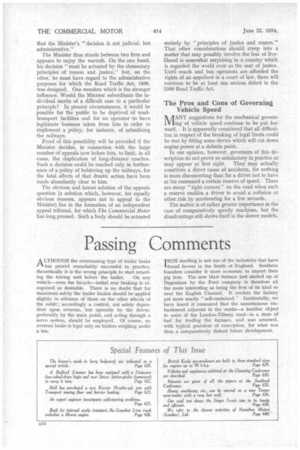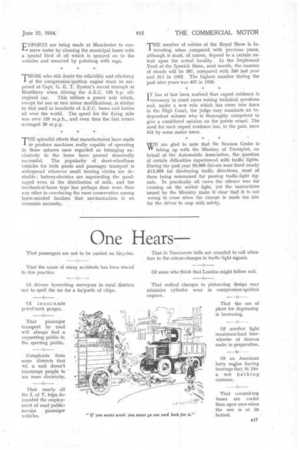Passing Comments
Page 30

Page 31

If you've noticed an error in this article please click here to report it so we can fix it.
A LTHOUGH the overrunning type of trailer brake has proved remarkably successful in practice, theoretically it is the wrong principle to start retard
ing the towing unit before the trailer. On any vehicle—even the bicycle—initial rear braking is recognized as desirable. There is no doubt that for maximum safety the trailer brakes should be applied slightly in advance of those on the other wheels of the outfit; accordingly a control, not solely dependent upon overrun, but operable by the driver, preferably by the main pedal, and acting through a servo system, should be employed. Of course, an overrun brake is legal only on trailers weighing under a ton. I RON smelting is not one of the industries that have
found favour in the South of England. Southern founders consider it more economic to import their pig iron. The new blast furnace just started up at Dagenham by the Ford company is therefore all the more interesting as being the first of its kind so near the English Channel. It renders the factory yet more nearly "sell-contained." Incidentally, we have heard it rumoured that the mountainous em
bankment adjacent to the works a familiar object to users of the London-Tilbury road—is a store of fuel for feeding the furnace, and was amassed, with typical grandeur of conception, for what was then a comparatively distant future development.
EFFORTS are being made at Manchester to conserve water by cleaning the municipal buses with a special kind of oil which is sprayed on to the vehicles and removed by polishing with rags.
THOSE who still doubt the reliability and efficiency I of the compression-ignition engine must be surprised at Capt. G. E. T. Eyston's recent triumph at Mantlhery when driving the A.E.C. 130 lip. oil engined car. This utilizes a. power unit which, except for one or two minor modifications, is similar to that used in hundreds of A.E.C. buses and lorries all over the world. The speed for the flying mile was over 120 m.p.h., and even then the fuel return averaged 30 m.p.g.
THE splendid efforts that manufacturers have made to produce machines really capable of operating in those spheres once regarded as belonging exclusively to the horse have proved deservedly successful. The popularity of short-wheelbase vehicles for both goods and passenger transport is widespread wherever small turning circles are desirable; battery-electrics are superseding the quadruped even in the distribution of milk, and the mechanical-horse type has perhaps done more than any other in convincing the most conservative among horse-minded hauliers that mechanization is an economic necessity. THE number of entries at the Royal Show is interesting when compared with previous years, although it must, of course, depend to a certain extent upon the actual locality. In the Implement Yard at the Ipswich Show, next month, the number of stands will be 387, compared with 349 last year and 311 in 1932. The highest number during the past nine years was 467 in 1928.
IT has at last been realized that expert evidence is necessary in court cases raising technical questions and, under a new rule which has come into force in the High Court, the judge may nominate an independent witness who is thoroughly competent to give a considered opinion on the points rais,ed. The need for such expert evidence has, in the past, been felt by some motor users.
WE are glad to note that Sir Stenson Cooke is Vv. taking up with the Ministry of Transport, on behalf of the Automobile Association, the question of certain difficulties experienced with traffic lights. During the past year 20,000 drivers were fined nearly £12,000 for disobeying traffic directions, most of these being summoned for passing traffic-light signals. In practically all cases the offence was for crossing on the amber light, yet the instructions issued by the Ministry make it clear that it is not wrong to cross when the change is made too late for the driver to stop with safety.




























































































